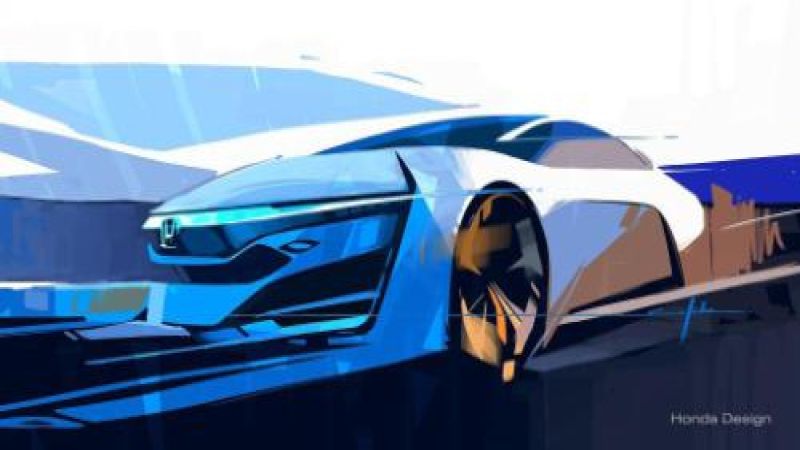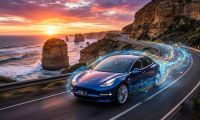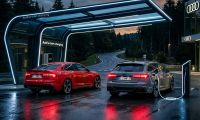I emphasize "approaching." Today, a sketch was released of the FCEV concept car along with Honda’s vow to produce and market the car in late 2015. First in North America, Japan and later in Europe. Honda has performed extensive “ bench testing” of fuel cell,electric vehicles through a corporate fleet leasing program since 2002. The first FCEV was put into the driving hands of a retail customer in 2005. Today, there are 15 or so on the road.
Good news, but very slow progress for a "working" concept in place for well over 2 decades. While a step in the direction of logical automotive engineering progression, consumers should not expect mass-marketing of a 2014 Civic based FCEV any time soon. It may be noted that Honda is not the only major player in the "alternative fuel" propulsion game.
I recall a Mercedes Benz S Class Concept of the early 1990s touring the United States in the promotion of fuel cell technology. Yes, the technology was on the German drawing board 2.5 decades ago.
The only visual evidence of “ exhaust” was a trickle of water. The rep demonstrating the car claimed that one could drink it. In the 90s, the public wasn't ready for a fuel cell, electric hybrid automobile. Today, consumer awareness and concern for the environment has heightened as we witness measurable cause and effects of global warming and cooling. And then there’s the dependency on foreign imported crude.
The world economy is tied to the availability of affordable, available crude or natural gas. By eliminating that ‘mass dependency’ on fossil fuel, not only would the United States benefit, all developed and emerging economies would benefit. Take a look at the smog in China. From time to time pollution originating in Asia, “ makes land” on the mainland of the U.S.
As announced in July, General Motors, Honda and the United States Army have partnered in fuel cell research and development. The hook for the military is an obvious one. With fuel cell technology, the endless logistic pursuit of available fuel is reduced to nil. The reduction or elimination of fuel dependency in a war zone is of major advantage, and in some instances, can preserve lives while leading to victory. While International Harvester ( Tristar) does offer an electric hybrid drive train and chassis for bus and military, the next logical progression is FCEV.
“The Honda FCEV Concept demonstrates the company’s vision for the future of personal mobility and our commitment to developing advanced alternative fueled vehicles.” Said Mike Accavitti, Senior V.P. of American Honda Motor Co., Inc.
A leader in fuel efficiency and low emissions transportation development for decades, Honda has been recognized as a “ low impact” automotive industry leader in the development of hybrid and alternative fuel vehicles.
Today, the Accord Hybrid, Plug-in Sedan, Honda Fit and Civic Natural Gas tops lists for the “ greenest” cars in the U.S. The Honda FCX was named “ World Green Car” by by the ACEE in 2009.
If you plan on attending the 2013 Los Angeles Auto Show, look for Honda to reveal the FCEV Concept Nov., 20 at 1:35 pm. Also, take a look at the all new 2014 Civic, soon to be America’s best-selling( again) compact car.
Set Torque News as Preferred Source on Google












Comments
Video of Hydrogen Re-Fueling
Permalink
Video of Hydrogen Re-Fueling Station ... Impressive...
"New fuel cell sewage gas station in Orange County, CA may be world's first"
http://abclocal.go.com/kabc/story?section=news/local/orange_county&id=8310315
"It is here today and it is deployable today," said Tom Mutchler of Air Products and Chemicals Inc., a sponsor and developer of the project.
Welcome Mark. Growing up n
Permalink
In reply to Video of Hydrogen Re-Fueling by Mark Gunnar (not verified)
Welcome Mark. Growing up n Huntington Beach Ca, and surfing in the largest sewer plume on the West Coast, I find the news to be progressively encouraging. 16 million people in Orange and San Diego County alone. It's time to make a move on low impact, renewable fuel. If we can recover methane or other bi-product gas from sewage to do so, great... Thanks for the link...
Hyundai released their FCEV
Permalink
Hyundai released their FCEV this year and will begin mass production shortly. GM, Toyota, and Daimler are aiming for 2015 release dates along with Honda. Most H2 research is happening in Europe and Japan, where the political atmosphere towards hydrogen has been more friendly, without the idiot naysayers claiming it's some kind of Big Oil conspiracy to take the emphasis off their precious battery electrics.
I was remotely involved (
Permalink
In reply to Hyundai released their FCEV by Aaron Turpen
I was remotely involved ( alternative energy distributor) in a late 1980's research program at Humboldt State University. At that time, engineers involved in the promotion of solar cell and alternative energy development jumped on the Hydrogen Fuel Cell band -wagon. The program ran out of dollars. before moving past the working prototype stage. Yes, they had one... As you stated, big oil dollars kill such programs as well as $ support the propaganda that bolsters the " fear" side of the " explosive' fuel cell technology. Crap...
I love the "Big Oil" mythos
Permalink
In reply to I was remotely involved ( by Parks McCants
I love the "Big Oil" mythos and all of the evils it's supposedly done to destroy "alternative energy." The biggest investors in alternative energy are oil companies and the argument against hydrogen often states that "it's promoted because Big Oil will make money off of it." People need to come to grips with the fact that "Big Oil" are nothing more than energy companies - the very companies who likely power your house, recharge your EV, pipe the methane to your house for heating, etc. They're ENERGY companies, not "Big Oil" companies. Exxon posts more profits (by profit % vs costs) in energies that AREN'T oil than they do oil. The whole mantra about the evil Big Oil destroying alternative energy is empty and lame. You'll notice I didn't say that Big Oil killed H2 fuel cells, I said that they are blamed for making it a focal point now ahead of battery electrics. The truth is, no matter what alt energy choice(s) are made, energy companies (being in the business of energy) will profit regardless. This is why Shell, Exxon, BP and all the rest put so much into these programs.
I worked for Standard Oil of
Permalink
In reply to I love the "Big Oil" mythos by Aaron Turpen
I worked for Standard Oil of California as a plant operations engineer back in the day. They are evil. O.K., putting all semantics analyses aside, I agree with you. In the long-term, energy suppliers and distributors will benefit from the alternative fuel distribution, and or recharging of any future mode of transportation. However, there is viable argument for the "stall" put on technological progress in the development, manufacturing and sales of any automotive product or vehicle not reliant on petroleum distillates; a $ Billion per minute suck on the world economy. Put your ear to the ground... Can you hear it? Thanks Aaron. Good point...
I know many people in the oil
Permalink
In reply to I worked for Standard Oil of by Parks McCants
I know many people in the oil business. Very few of them hold your opinion of oil companies. As for the rest.. oil was the cheapest form of energy, so there was no marketable reason to look for or invest in alternatives until oil started to become more expensive. There's a reason oil won out as the energy source of choice and it had nothing to do with anyone being "evil."
Looks very nice. Do you think
Permalink
Looks very nice. Do you think the design cues from this Honda FCEV will end up on much of Honda's range? I wish it was all electric.
Thank you Jean Clode for
Permalink
Thank you Jean Clode for dropping by.. Good question. I believe if you take a close look at the artist's concept drawing, you will note " key" Honda design elements. I don't believe it to be too far of a stretch to assume that the Honda's of the near future will imitate many aspects of the drawing. As to " all electric," why, what is your though here? As you know, A dependent " plug in" design requires an external source of fuel or alternative generated electricity. In the case of the Hydrogen Fuel Cell, the residue left by the process is H2O...What could be better than that? Solar? Not yet...